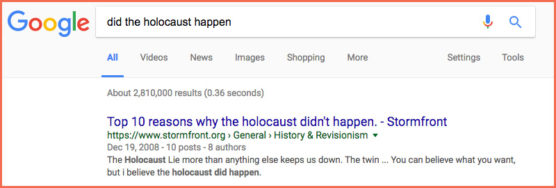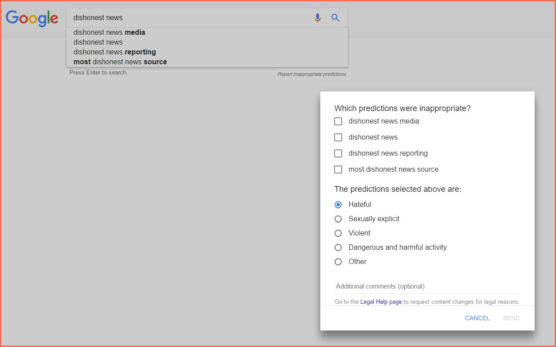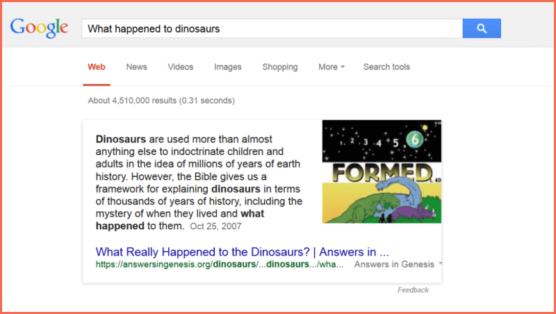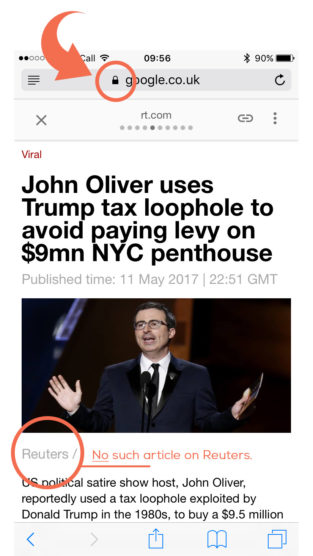Hello again fellow digital marketing enthusiasts! I’m Adam Ward, Head of Creative at Crescat Digital, and here to fill you in on the dishonest news flooding our search engines. Let’s dig right into it.
The State of Search
Google has a serious search quality problem. This has only been exacerbated in the last several months following a rather tumultuous US presidential election in November. Growing concerns over low-quality, false and misleading news articles topping SERPs – including ominously incorrect answers, and disturbingly offensive search suggestions has finally reached its zenith within the public consciousness.

One of the most damning examples of this type of dishonest news (as I like to call it), came to light in December when it was discovered that search queries for “did the Holocaust happen” returned a rather baffling top result. Stormfront, an American neo-Nazi group, had somehow overshadowed the likes of Wikipedia, the BBC, and other authoritative sources to list the “Top 10 reasons why the holocaust didn’t happen” above any semblance of a more educational and factual-based piece of content – i.e. ‘honest news.’
Needless to say, the truth is out there but you may have to check page 2 in order to find it. The search for honest news continues…
With users airing their frustrations, Google has had to react; and so they did – On April 15th Google announced ‘Project Owl’ a trifecta of algorithmic changes and search alterations designed to combat this new era of problematic punditry. For expediency, I have broken down what this means for the world of search, below:
1. The Quality of Search
Google have had a dedicated team whose sole responsibility has been to monitor, oversee and evaluate general search quality. Up until recently the exact remit of these ‘evaluators’ has been somewhat shrouded in mystery. However, with the introduction of Project Owl comes a revision in Google’s Search Quality Rating Guidelines highlighting more detailed examples of low-quality site pages for evaluators to suitably flag up. This is specifically targeted at misleading information and intentionally offensive page results. Google also claim this will help its algorithms in ‘demoting’ this type of specified content. In other words, honest news has prioritisation over dishonest news – a given, one would think.
2. The Automation of Search
Probably the most evident alteration made by Google in the search for honest news comes by way of search suggestion improvements. Autocomplete, the search function that suggests topics to a user as they type out their query into Google, has seen the mass rollout of the ‘report inappropriate suggestions’ link underneath the search bar. By interacting with this link a form pops up allowing search predications to be reported as hateful, sexually explicit, violent or including dangerous and harmful activity, plus a broad ‘other’ option which allows comments.

3. The Evaluation of Search
Another area to see similar feedback improvements are Featured Snippets, also known as rich answers, that provides a dedicated block at the top of a search results page which includes a summary answer of the question a user posed to Google. These featured snippets have been openly criticized over the years due to several misleading answers, unfounded conspiracy theories, and one truly absurd attempt at child-targeted Christian propaganda…

Similarly to autocomplete, these answer blocks include a feedback form to better allow users the ability to evaluate the information they receive within a snippet. This feedback form had already been implemented for rich snippets, however the options had been rather limited. Google have noted that they plan to use this feedback to further improve their algorithms.
The Transparency of Search
On a broader scale, Google has decided to expand their product transparency, in large because of the dishonest news backlash. Over at the Keyword blog, VP of Engineering Ben Gomes notes that “we’ve been asked tough questions about why shocking or offensive predictions were appearing in Autocomplete. Based on this, we evaluated where we can improve our content policies and updated them appropriately.” This statement was supported by the publication of the new policy to their help centre, for further reading…
A concerted effort to provide users with a more contextual understanding of how search is being improved, and more importantly how dishonest news articles are being targeted for removal, is a sturdy step in the right direction.
The Accountability of Search
The moral obligation search engines have inherited due to the enormous influence on everyday life, shouldn’t be taken for granted. To see that company’s like Google and Bing are continuously adapting and evolving their algorithms to weed out hateful, offensive or explicit materials isn’t simply a legal responsibility, it is also a civil duty.
At present 0.25% of every search query is returning misleading information. Considering there are trillions of searches on Google every year. TRILLIONS! Perhaps we can all give them a little latitude when it comes to effectively combating this persisting problem.
The Future of Search

How will this effect search traffic and site rankings? What alterations will need to be made with Search Engine Optimisation for webpages? Will these algorithmic changes ultimately damage certain sites that are unwillingly effected (even innocent of any wrongdoing)? This happened before with Panda, the last major update Google made, so it’s fair to say it could easily happen again.
This may also have an impact on the implementation of AMP pages. I recently wrote about Accelerated Mobile Pages and their growing use within the global news sphere, yet what role will they play in the broader scheme of things? Only recently Andrew Betts, principle developer advocate at Fastly and member of W3C TAG, shed a light on AMP’s susceptibility to fake news like the other areas of search currently being targeted.
Betts highlights more search-related propaganda, this time from Russia Today, an organisation solely funded by the Russian Government. He argues that as an AMP article starts with a “reassuring padlock” followed by google.co.uk the person reading can easily be manipulated into believing this content is legitimate. He calls this situation “catastrophic.” This could irrevocably harm AMPs future reputation, especially if it becomes an easy and more effective alternative to spreading large quantities of hate and misinformation. I would argue that Google need to hastily address this within the remit covered by Project Owl.
The Profit of Search & Dishonest News
What will matter most to sites, when it comes to Google’s search revisions, will likely come down to the statistics based on readership and ad revenue. Should these algorithm modifications alter authoritative website rankings or sources of dishonest news continue to outmanoeuvre Google’s fixes, it could be hypothesised that millions of pounds in income might be in imminent jeopardy of evaporating.
As the web’s inventor, Sir Tim Berners-Lee, put it in an open letter on the world wide web’s 28th birthday “sites show us content they think we’ll click on – meaning that misinformation, or ‘fake news’, which is surprising, shocking, or designed to appeal to our biases can spread like wildfire. And through the use of data science and armies of bots, those with bad intentions can game the system to spread misinformation for financial or political gain.”


